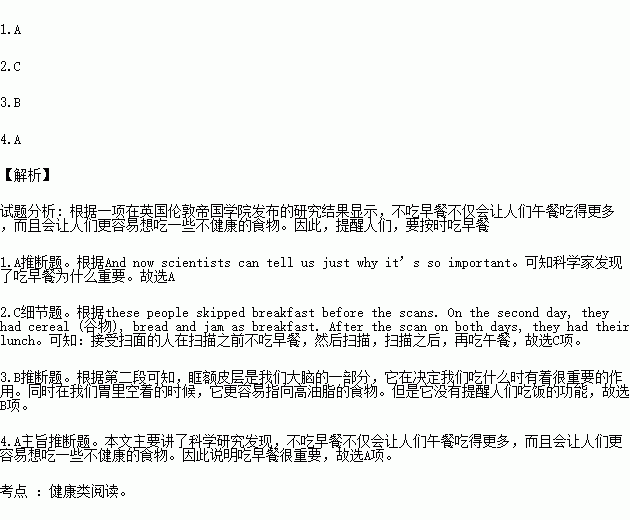题目内容
Eat like a king in the morning, a prince at noon, and a peasant at night. This saying is all about the importance of breakfast. And now scientists can tell us just why it’s so important. According to a study carried out at Imperial College London, UK, skipping the first meal of the day not only means you eat more at lunch, but also that your brain wants to find more unhealthy foods.
The study suggests that there is a special part of our brain called the orbitofrontal cortex (眶额皮层), which plays an important part in making choices about what we eat. It is used for identifying the taste of food, especially when skipping breakfast. It is more likely to target high-calorie foods when you’re on an empty stomach.
Scientists did an experiment on this. Dr Tony Goldstone from Imperial College London, scanned (扫描) the brains of 21 men and women, around the age of 25. On the first day, these people skipped breakfast before the scans. On the second day, they had cereal (谷物), bread and jam as breakfast. After the scan on both days, they had their lunch.
When the volunteers had skipped breakfast, they ate around 20 percent more at lunch, compared with days when they had eaten breakfast. Their brain scans also showed the orbitofrontal cortex was especially responsive to high-calorie foods. “We believe that bit identifies the value of foods – how pleasant, how delicious something is,” Goldstone told The Guardian.
1.From Paragraph 1, we learn that _____.
A. scientists found out why eating breakfast is important
B. it’s easy to lose weight without breakfast
C. there’s no need to have good food for supper
D. eating breakfast makes your brain smarter
2.Which is the correct order for the experiment on the first day?
① The volunteers skipped breakfast.
② The volunteers had lunch.
③ The volunteers had a brain scan.
A.①②③ B.③②① C.①③② D.③①②
3.Which of the following is NOT true about the orbitofrontal cortex?
A. It is part of our brain.
B. It tells people to eat breakfast.
C. It decides which food we like.
D. It is active toward high-calorie foods.
4.Which of the following can be the title for this passage?
A. Breakfast still most important
B. Three meals a day
C. Experiments on breakfast
D. Researches on lunch
 七彩题卡口算应用一点通系列答案
七彩题卡口算应用一点通系列答案
